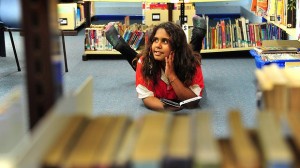Buk Bilong Pikinini
INDIGENOUS READING PROJECT
SOMETIMES the simplest idea can make the biggest difference.
Canberra bureaucrat Daniel Billing is all too familiar with the stark gap in literacy achievement between indigenous and non-indigenous students across Australia as he spends his working week specialising in student engagement and indigenous education within the federal Education Department.
But three years ago, the purchase of a Kindle sparked an idea for a simple and cheap way to try and reduce that gap. Noticing how his then seven-year-old intuitively and enthusiastically took to the electronic reading device, Mr Billing came up with a plan to fund Kindles for indigenous students in an effort to boost their interest in reading.
”Kids love technology and they are innately drawn to it. Kindles are also relatively cheap to buy at around $200, so you can exploit a cheap technology to encourage kids to read no matter where they are in the country,” he said. ”Certainly in the more remote parts of Australia it’s cheaper to send a Kindle than ship in books.”
But Mr Billing’s plan had a twist. As a condition of receiving a Kindle, students committed to measurably improving their reading and comprehension. If they succeeded, they kept the Kindle as a reward. If they didn’t, the Kindle was returned just like a library book.
Gathering a small band of friends and supporters, Mr Billing founded the Indigenous Reading Project which this year sent out 20 Kindles to students from as far afield as Canberra to far north Queensland.
When the ACT’s only participant, Forrest Primary School sixth-grader Yulcaila Hoolihan-Mongta, received her Kindle earlier this year, the 11-year-old had a reading age of nine, and spent an average of just 45 minutes a week reading.
After 12 weeks with a Kindle, Yulcaila increased her weekly reading to two hours and 20 minutes and gained about a year’s worth of reading ability, says teacher Jemma O’Brien.
”Yulcaila has completed over six novels and her confidence when reading independently has improved. She is proud to be seen reading. She is more willing to read aloud … She is developing a real love for children’s literature and is able to comprehend more difficult text in all areas of the curriculum,” Ms O’Brien said.
Yulcaila says: ”It’s been pretty good to have it because now I can practise reading and read a bit faster. The books are really good, too. I think I am reading more.”
Mr Billing said the project had received 100 applications from across the country at the start of the year after he wrote to schools with high enrolments of indigenous students.
Students were chosen based on their teacher’s recommendation and needed to be at or below national benchmarks in literacy, although not so low that they could not be independent readers. They were measured on fluency and comprehension by their teachers at the start of the program and at the end.
Mr Billing said just one student out of the 20 had failed to keep the Kindle, and another three had dropped out of the program when they moved to other communities.
All four Kindles were returned in mint condition.
Children increased their weekly reading time by 154 per cent, while reading fluency or speed increased by 51 per cent and reading comprehension scores were up by 43 per cent.
”So often indigenous interventions are expensive and ineffective and in response to a crisis. So it’s nice to work on something cheap, simple and successful like this,” Mr Billing said.
”I am just a public servant living in the suburbs and our group of supporters is tiny, so the challenge is now to take a good idea to the next level.”
The Indigenous Reading Project is seeking donations to fund 100 Kindles next year, and to thoroughly analyse the changes in literacy achievement.
For $3.50 a week or $15 a month, anyone can sponsor a child at irp.org.au.

